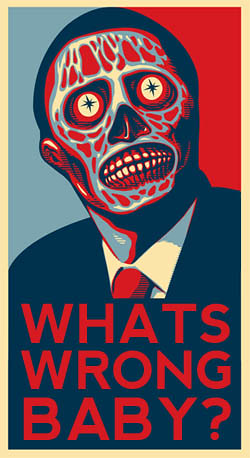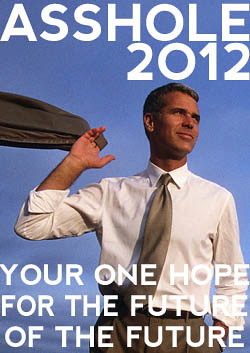|
Tuesday, September 6, 2005
Predictably enough, the president has come under attack in the wake of the New Orleans disaster, as embittered partisans seek to blame him for every little thing the agencies under his control failed to do for days while Americans were starving and drowning to death. Loose talk of lack of preparation, underfunded levees, and apathetic response has provided some with the mistaken impression that the US government could've done more to save those trapped in the destroyed city. This, of course, is ridiculous: as anyone knowledgable in the nature of the structure and history of the American executive branch would explain, the president is utterly powerless in the face of disaster, and can only look on helplessly and leave things to those powerhouses in local government.
There's only so much the leader of the free world can do in the event of a crisis. Yes, the military and the national guard can be used to deliver vital supplies and evacuate trapped residents, and critical assets can be seized with emergency powers. But who has the ability to do all this? The chain of command is too elaborate and byzantine to determine who was running the national emergency response last week. Some say it was Louisiana governor Kathleen Blanco giving orders to army and FEMA officials, some say it was New Orleans mayor Ray Nagin, some say it was all being supervised by an elderly notary public, some say its communications snafus and bureaucratic delays are the result of the troublesome meddling of trickserish gremlin-folk, some say it was created by the demiurgic Yaldabaoth in the time before time. The truth may be lost to us forever, but of one thing we may be certain: the federal government was surely powerless to intervene in the catastrophe. If only there existed some sort of federal agency for emergency management, perhaps under the supervision of a cabinet-level department for securing the homeland! In the absence of such powers and resources, what is a chief executive to do but bolster morale as best he can through boisterous jokes and heartily-staged photo ops? Indeed, the president even attempted to soften the blow to the national economy by dispatching his secretary of state on a vigorous shopping mission, instead of wasting her time with frivolous international aid offers. More importantly, one must recognize that there are limits to what powers the federal government should exercise in a crisis. Yes, it is the right and duty of the president to override state drug policy, to determine who can or cannot marry, to indefinitely detain citizens without due process and to torture and kill prisoners as he sees fit, but disaster relief is a matter that should be left to the states. Yes, the images of the drowned, the diseased, and the desperately dying drove much of the country to outrage, but how much more outraged would America have been if FEMA had fed the Superdome refugees without the full oversight and authorization of the State of Louisiana? Had the president sent rescue helicopters to evacuate New Orleans the day the levees burst, he might have saved thousands of lives, but he would also have overstepped his authority - and if there's one thing George W. Bush refuses to countenance, it is abuse of power. Of course, the lion's share of responsibility for disaster management falls on the individual. With their homes destroyed and their city flooded, the people of New Orleans could have simply designed and constructed boats from the plentiful driftwood and sailed to safety; instead, they panicked and scrambled for uncontaminated water and insulin. Learn from their example, America, and be prepared for the next disaster! Town halls should discuss the quickest way to redeploy the national guard units in their neighborhoods. Every family should keep their emergency rations stocked and their escape helicopters fueled and ready. The life you save will have to be your own: no one else will do it.
posted by the Medium Lobster at 12:36 PM
|
|












|